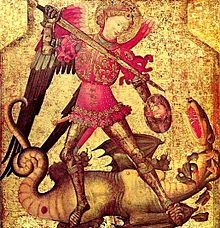Comparative Religion/Gods
micheal, mars and ares



archangel micheal astrological sighn the sun Michael ("who is like God?" Daniel refers to Michael as a "prince of the first rank" lattter-day Saints (also known informally as Mormons) believe that Michael is Adam, the Ancient of Days (Dan. 7) adam= micheal lillith=venus.Aphrodite n the 4th century, Saint Basil the Great's homily (De Angelis) placed Saint Michael over all the angels. He was called "Archangel" because he is the prince of the other angels, leader of the Army of God He is viewed as the angelic model for the virtues of the spiritual warrior
charles Haddon Spurgeon,[52][53] a Trinitarian, stated that Jesus is Michael �the only Archangel�,[54] and that he is God the Son, and co-equal to the Father.[52] In Spurgeon�s view, "archangel" means "head of the angels" rather than "head angel," and is a title similar to "Prince or Leader of the host." (Daniel 8:11)[ eventh-day Adventists believe that "Michael" is but one of the many titles applied to the Son of God, the second person of the Godhead. According to Adventist Michael is also the commander of God's army In late medieval Christianity, Michael, together with Saint George, became the patron saint of chivalry and is now also considered the patron saint of police officers, paramedics, firefighters and the military Michael in the Hebrew language means "Who is like God?" or "Who is equal to God?" St. Michael has been depicted from earliest Christian times as a commander, who holds in his right hand a spear
roman god mars astrological sighn mars In ancient Roman religion and myth, Mars (Latin: Mars, [ma?rs]) was the god of war and also an agricultural guardian, a combination characteristic of early Rome.[1] He was second in importance only to Jupiter and he was the most prominent of the military gods in the religion of the Roman army guardian of the Roman people Mars represented military power as a way to secure peace, and was a father (pater) of the Roman people.[5] In in Roman art, Mars is depicted as either bearded and mature, or young and clean-shaven. Even nude or seminude, he often wears a helmet or carries a spear as emblems of his warrior nature. also consort to venus
Ares (/ˈɛəriːz/; Greek: Ἄρης [árɛːs]) is the Greek god of war. He is one of the Twelve Olympians, and the son of Zeus and Hera.[1] In Greek literature, he often represents the physical or violent and untamed aspect of war, in contrast to his sister the armored Athena, whose functions as a goddess of intelligence include military strategy and generalship.[2] the word ares is used as a common noun synonymous with "battle."[3]
greek god ares astrological sighn mars said to be a coward and fled from typon In Renaissance and Neoclassical works of art, Ares's symbols are a spear and helmet The union of Ares and Aphrodite created the gods Eros, Anteros, Phobos, Deimos, Harmonia, and Adrestia. While Eros's and Anteros's godly stations favored their mother, Adrestia preferred to emulate her father,